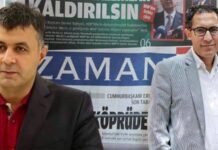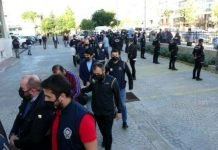Akın İpek, a Turkish businessman and the founder of Koza İpek Holding who has been living in the UK since 2015, has called on the European Court of Human Rights (ECtHR) to revise its decision declaring his 2018 complaint “inadmissible” by pointing out examples of misinformation included in the judgment, Turkish Minute reported on Friday.
Once belonging to İpek family, Koza İpek Holding was seized by the Turkish government in 2015 due to its alleged links to the Gülen movement, which is labeled by President Recep Tayyip Erdoğan and his ruling Justice and Development Party (AKP) as a terrorist organization.
The Gülen movement is a faith-based group that focuses on science education, volunteerism, community involvement, social work and interfaith and intercultural dialogue and is inspired by the teachings of Muslim preacher Fethullah Gülen.
The ECtHR on Thursday issued its decision on İpek’s complaint submitted on December 12, 2018, which stated that the seizure of Koza İpek Holding, which had investments in mining, tourism and media and was believed to have been valued at about $10 billion, violated his right to peaceful enjoyment of possessions, freedom of expression and the presumption of innocence.
“The ECtHR should correct this mistake. The trustees weren’t appointed to our holding by KHKs [emergency decree-laws]. They were appointed in 2015 through a report, which was proven in 2016 by the Financial Crimes Investigation Board [MASAK] to have been forged. The MASAK report that exonerates us was kept hidden from us. … How is this not a rights violation?” İpek said.
“The prosecutor was unable find any evidence that Koza İpek Group was involved in money laundering or any other financial crimes, and our case file doesn’t include a decision regarding such accusations,” the businessman added.
İpek said although the MASAK inspection reports revealed no activities of Koza İpek Holding companies that could constitute terrorism financing, they were transferred to Turkey’s state-run Savings Deposit Insurance Fund (TMSF), anyway.
“It was revealed that neither the Koza İpek Group nor the İpek family had ever obtained even a single dollar illegally. We aren’t accused of this,” İpek said.
He also indicated that recent reports by the Venice Commission and the EU include enough evidence showing that Turkish criminal peace judgeships are not independent or impartial, with scores of people receiving unfair trials, his holding and family being no exception.
A regional appeals court in May upheld a prison sentence of 79 years, eight months for Cafer Tekin İpek, a brother of Akın İpek, and a prison sentence of 11 years, eight months for his mother, Melek İpek. They were given the sentences on charges of membership in a terrorist organization and tax evasion at the end of a trial concluded in January by the Ankara 24th High Criminal Court.
Cafer Tekin İpek has been behind bars since April 2016. Melek İpek was a well-known and respected woman even among AKP circles as a pioneer of charity activities before the government crackdown on the Gülen movement began.
Erdoğan has been targeting followers of the Gülen movement since the corruption investigations of December 17-25, 2013, which implicated then-Prime Minister Erdoğan, his family members, and his inner circle.
Dismissing the investigations as a Gülenist coup and conspiracy against his government, Erdoğan designated the movement as a terrorist organization and began to target its members. He intensified the crackdown on the movement following an abortive putsch on July 15, 2016, that he accused Gülen of masterminding. Gülen and the movement strongly deny involvement in the coup attempt or any terrorist activity.
In December 2020 Erdoğan addressed the issue of property rights lawsuits filed by Gülen-linked businesspeople and rumors that Turkey might have to return their assets in the future.
“They [members of the Gülen movement] have no such thing as property rights. They have a huge price to pay,” Erdoğan said.
















